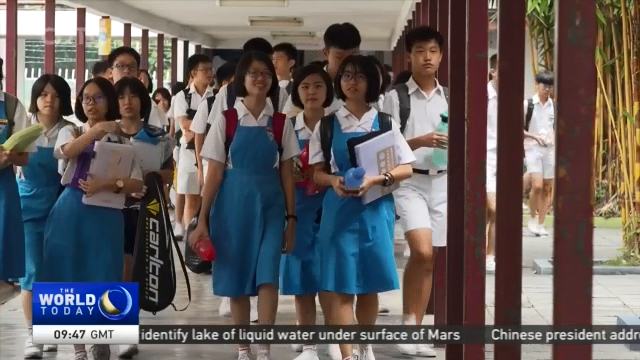
19:10, 26-Jul-2018
Malaysian Education: Community pushes for Chinese exam recognition
Updated
18:19, 29-Jul-2018
03:12

Teaching in Chinese in primary schools is a well-established part of Malaysia's national education system. But for students to continue Chinese education, their only option is to attend one of just 62 independent Chinese secondary schools, funded by donations from the community. And there's a big hitch. While many countries including China, Singapore and the US accept graduates of these schools to their universities, Malaysian public universities do not. Before being elected in May, the new governing alliance vowed to swiftly change that if they came to power. But the plan is facing resistance, Rian Maelzer has more.
In their final year, students at this century-old independent Chinese high school will sit for the Unified Examination Certificate or UEC. The UEC would gain them entry into many countries’ universities, but not public universities in Malaysia. So to further their studies, students either have to go to costly private universities or overseas -- a big worry for parents.
YAP CHOON LING MOTHER OF CHINESE SECONDARY STUDENT "Send them overseas or to private university is going to be very expensive. For ordinary people like us, it's just too much of a financial burden."
The parents were cheered when Pakatan Harapan won the national elections in May since its manifesto pledged to recognize the UEC exam results.
RIAN MAELZER KUALA LUMPUR "But now the new government says it was not one of the promises it pledged to fulfill in its first 100 days in office and that it needs to study the issue more."
CHEONG MOEY LIAN, PRINCIPAL CHONG HWA INDEPENDENT HIGH SCHOOL "The new government should be given some time to sort out the issue. We really hope that they will recognize the Unified Examination Certificate, which will give more options for our students to further their studies after high school. They'll be able to go into local universities."
After completing primary school, the vast majority of ethnic Chinese here now go to national secondary schools where most subjects are taught in the Malay language and all races mix together often for the first time. Ethnic-Malay opposition political parties and NGOs say recognizing the Chinese high school certificate will change that picture.
IBRAHIM ALI MALAY RIGHTS ACTIVIST, PERKASA "It goes against the spirit of national unity. A country should have their own identity and in Malaysia, Malay language is the national language and this is the unity language. How do you expect one day we can see a real national unity in Malaysia? So it must start with the education of system."
The new government will have to strive to avoid disappointing the ethnic Chinese, more than 90 percent of whom voted for them, while reassuring ethnic Malays that the status of Malay language will be not weakened. Rian Maelzer, CGTN, Kuala Lumpur.

SITEMAP
Copyright © 2018 CGTN. Beijing ICP prepared NO.16065310-3
Copyright © 2018 CGTN. Beijing ICP prepared NO.16065310-3